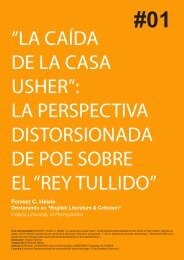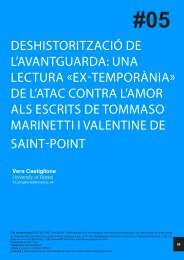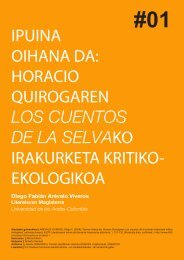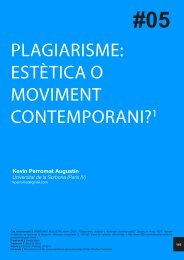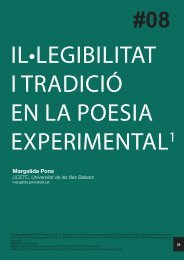a nation of ghosts?: haunting, historical memory and ... - 452ºF
a nation of ghosts?: haunting, historical memory and ... - 452ºF
a nation of ghosts?: haunting, historical memory and ... - 452ºF
You also want an ePaper? Increase the reach of your titles
YUMPU automatically turns print PDFs into web optimized ePapers that Google loves.
“transition as a transaction” between political elites. This negotiated<br />
burial <strong>of</strong> the past implicated that political amnesty was thus predicated<br />
upon <strong>historical</strong> amnesia. As a result, the memories <strong>of</strong> the civil war<br />
<strong>and</strong> <strong>of</strong> Franco’s legacy became a new cultural taboo, <strong>and</strong> therefore<br />
acquired the spectral quality <strong>of</strong> <strong>ghosts</strong>, nor here nor there. National<br />
identity became tainted with self-questioning <strong>and</strong> a general sense <strong>of</strong><br />
disorientation. Simultaneously, the <strong>of</strong>ficial silencing <strong>and</strong> forgetting<br />
<strong>of</strong> the <strong>nation</strong>al past came with the affirmation <strong>of</strong> other sub-state<br />
identities, h<strong>and</strong> in h<strong>and</strong> with the reconstruction <strong>of</strong> their particular<br />
collective memories. The shortcomings <strong>of</strong> the transition <strong>and</strong> the<br />
resulting political malaise generated a sense <strong>of</strong> cultural desencanto,<br />
particularly with the anti-Franco sectors <strong>of</strong> the population, marked by<br />
the disillusion with the pragmatic transactional aspect <strong>of</strong> the transition<br />
<strong>and</strong> the general dissolution <strong>of</strong> collective hopes <strong>of</strong> the past <strong>and</strong> the<br />
former unity <strong>of</strong> the anti-Franco resistance. Memory eventually came<br />
to occupy a residual space with a sense <strong>of</strong> nostalgia for a utopian<br />
future indefinitely postponed.<br />
In spite <strong>of</strong> the gr<strong>and</strong> narrative <strong>of</strong> the Spanish transition as an<br />
overwhelming success story, which in fact has become a foundational<br />
myth <strong>of</strong> Spanish modernity 1 , there are some limitations inherent<br />
to the process <strong>of</strong> Spanish democracy which cultural critics <strong>and</strong><br />
historians have noted in hindsight, in particular the way <strong>of</strong> dealing<br />
with the past, or perhaps, <strong>of</strong> not dealing with it 2 . The politics <strong>of</strong><br />
<strong>memory</strong> <strong>of</strong> the transition has been repeatedly described as the<br />
erasure <strong>and</strong> eradication <strong>of</strong> <strong>historical</strong> <strong>memory</strong>, <strong>and</strong> the forgetting<br />
<strong>and</strong> silencing <strong>of</strong> the past (Morán 1991, Medina 2001, Colmeiro<br />
2005, Labanyi 2007). While that perception is based on the <strong>of</strong>ficial<br />
“pact <strong>of</strong> forgetting” brokered by the political elites <strong>and</strong> is in general<br />
terms accurate, I would like to raise a few points for consideration<br />
<strong>of</strong> the role <strong>of</strong> <strong>memory</strong> during the Transition. One is that we should<br />
take into account the asymmetry <strong>of</strong> memories across the <strong>nation</strong>al<br />
geography. The atrophy <strong>of</strong> <strong>memory</strong> in the <strong>nation</strong>al political discourse<br />
was parallel to the recovery <strong>of</strong> <strong>historical</strong> <strong>memory</strong> in the peripheries<br />
<strong>of</strong> the <strong>nation</strong>-estate, where local forms <strong>of</strong> sub-state <strong>nation</strong>alism<br />
relied heavily on a different collective <strong>memory</strong>. A major component<br />
<strong>of</strong> the recognition <strong>of</strong> cultural <strong>and</strong> ethnical difference <strong>of</strong> the so called<br />
“<strong>historical</strong> <strong>nation</strong>alities” <strong>and</strong> their dem<strong>and</strong>s for political rights was<br />
<strong>historical</strong> <strong>memory</strong>. The emphasis however was not in reparations or<br />
backward-looking justice, but in the restoration <strong>of</strong> pre- civil war local<br />
institutions <strong>of</strong> government, <strong>and</strong> Statues <strong>of</strong> Autonomy for Catalonia,<br />
Basque Country <strong>and</strong> Galicia, which had been cut short by Franco’s<br />
uprising against the Republic.<br />
The second point is that <strong>memory</strong> <strong>and</strong> forgetting are not a simple<br />
either-or phenomenon, since <strong>memory</strong> always necessarily involves<br />
forgetting, <strong>and</strong> “forgetting is full <strong>of</strong> <strong>memory</strong>”, as the Uruguayan poet<br />
Mario Benedetti has expressively stated (El olvido está lleno de<br />
NOTES<br />
1 | The Spanish Pavilion at the<br />
2010 World Expo in Shanghai<br />
celebrates spectacularly<br />
the narrative <strong>of</strong> Spanish<br />
modernization as a result <strong>of</strong><br />
the Transition, considered “el<br />
gran éxito de España” by the<br />
Spanish commissioner María<br />
Tena (Reinoso 2010).<br />
2 | “La Transición” has become<br />
a gr<strong>and</strong> narrative in Lyotard’s<br />
sense. Cultural critics have<br />
recently questioned the<br />
unexamined assumption <strong>of</strong><br />
the Spanish Transition as a<br />
“model” referring to its lack<br />
<strong>of</strong> closure in dealing with the<br />
past as well as its symbolic<br />
deficit (see Martín-Estudillo <strong>and</strong><br />
Ampuero 2008).<br />
A Nation <strong>of</strong> Ghosts?: Haunting, Historical Memory <strong>and</strong> Forgetting in Post-Franco Spain - José Colmeiro<br />
<strong>452ºF</strong>. #04 (2011) 17-34.<br />
25




